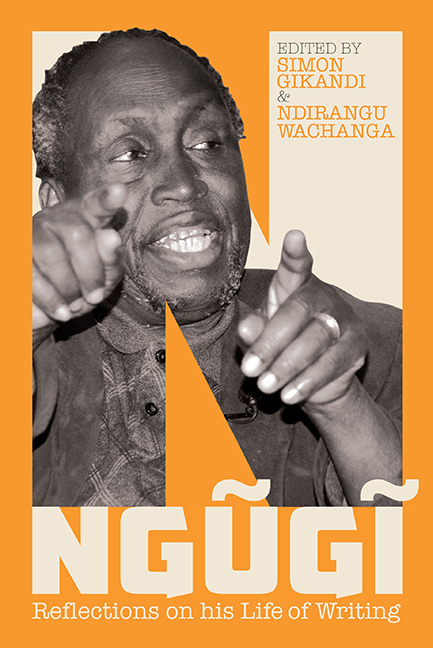Book contents
- Frontmatter
- Contents
- Preface
- Acknowledgements
- Chronology
- Photographic Section
- Introduction: Ngũgĩ wa Thiong'o: Reflections on His Life of Writing
- Ngũgĩ at Work
- Part I Serenades & Beginnings
- Part II Memories, Recollections & Tributes
- Part III Working with Ngũgĩ
- Part IV The Writer, the Critic & the World
- Part V The Other Ngũgĩ
- Appendixes
- Appendix A Review of Wizard of the Crow: Ngũgĩ's Homecoming Gift to Kenyans
- Appendix B Directing the River Back to its Course
- Appendix C For Grant Kamenju
- Appendix D Intellectuals, European & African Languages: Between Enslavement & Empowerment
- Appendix E A Riddle of Love
- References
- Bibliography of Ngũgĩ's Primary Works
- Works Cited
- Notes on Contributors
- Index
Appendix D - Intellectuals, European & African Languages: Between Enslavement & Empowerment
from Appendixes
Published online by Cambridge University Press: 27 July 2019
- Frontmatter
- Contents
- Preface
- Acknowledgements
- Chronology
- Photographic Section
- Introduction: Ngũgĩ wa Thiong'o: Reflections on His Life of Writing
- Ngũgĩ at Work
- Part I Serenades & Beginnings
- Part II Memories, Recollections & Tributes
- Part III Working with Ngũgĩ
- Part IV The Writer, the Critic & the World
- Part V The Other Ngũgĩ
- Appendixes
- Appendix A Review of Wizard of the Crow: Ngũgĩ's Homecoming Gift to Kenyans
- Appendix B Directing the River Back to its Course
- Appendix C For Grant Kamenju
- Appendix D Intellectuals, European & African Languages: Between Enslavement & Empowerment
- Appendix E A Riddle of Love
- References
- Bibliography of Ngũgĩ's Primary Works
- Works Cited
- Notes on Contributors
- Index
Summary
I want to look at the genealogy of the African intellectual relationship to African and European languages, English in particular. This is particularly relevant today when most of Africa is celebrating their fiftieth years of independence from colonial rule.
The intellectual is not a new creation in Africa, every society has had its intellectuals, intellectual here defined as a worker in ideas. They may do other things but their primary social significance and visibility was as workers in ideas. African healers, seers, artisans, including builders, would be in this category. The intellectual was an integral part of the old Egyptian, Ethiopic, Zimbabwean, and Songhai civilizations. A most important component of this pre-colonial intellectual was the poet who often combined the role of the historian, moralist and seer. In West Africa they call him the griot. Swahili civilization is replete with poets, leaders of thought, spanning centuries. A book edited by Abdilatif Abdalla and published by Mkuki na Nyota, Kale ya Washairi wa Pemba, lists quite a few including Fumo wa Liyongo. In total, Liyongo wa Baury in the twelfth century, Muyaka bin Haji in the eighteenth century, and Suudbin Said Al-Maamiriy in the nineteenth century. These poet-intellectuals largely saw themselves as voices of the people and seekers of justice. It may seem needless to say, but it is important to emphasize that these intellectuals, from Egyptian to Ungozi/Uswahili times, used the languages of their society. The pre-colonial African intellectual was rooted among their community.
Today I want to focus at the modern African intellectual, particularly. I am talking of course of the intellectual who has been to a modern school and for whom European languages have been means of his education. There have been two faces and phases of these African intellectuals, and these phases are almost contradictory.
The intellectuals of the anti-colonial struggle used European languages to get what they carried and then took it back to African languages, enriching them. They went into European languages as scouts.
- Type
- Chapter
- Information
- NgugiReflections on his Life of Writing, pp. 214 - 220Publisher: Boydell & BrewerPrint publication year: 2018



